|
|
|
Sort Order |
|
|
|
Items / Page
|
|
|
|
|
|
|
| Srl | Item |
| 1 |
ID:
134072
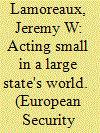

|
|
|
|
|
| Publication |
2014.
|
| Summary/Abstract |
The interest in small states ebbs and flows as important international affairs include small states. Russia's actions and policies vis-à-vis Ukraine, and the resultant intensified apprehension among Russia's smaller neighbours, aim the proverbial microscope at the size and power discrepancies between states. Russia, by most metrics, is a large state and the Baltic states, by those same metrics, are small states. Small-state scholars expect large and small states to act differently. However, the case of Russia and the Baltic states indicates that large and small states do not, in fact, act all that different. This being the case, this article calls into question many of the assumptions made by small-state scholars about the difference between large- and small-state action and argues for changes within small-state studies as a subdiscipline of the larger international relations discipline.
|
|
|
|
|
|
|
|
|
|
|
|
|
|
|
|
| 2 |
ID:
096014
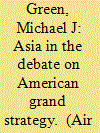

|
|
|
| 3 |
ID:
129693
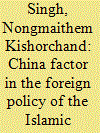

|
|
|
|
|
| Publication |
2014.
|
| Summary/Abstract |
The Islamic Republic of Iran has been the centre of global push and pull because of its geostrategic position and its engagement with other regional and international actors. And the controversy over Iran's foreign policy is as old as the Islamic public itself. The debate over its clandestine nuclear program and dispute with the west continue to dominate world headlines. In order to gain a better understanding of Iran, it is important to analyze its foreign policy through which one can access its position in the regional and international affairs.
|
|
|
|
|
|
|
|
|
|
|
|
|
|
|
|
| 4 |
ID:
125386
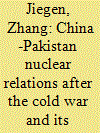

|
|
|
|
|
| Publication |
2013.
|
| Summary/Abstract |
Though China-Pakistan relations have been viewed by both countries as 'all weather, time-tested strategic cooperative partnership all along, there are comparative few studies relating to this bilateral relations in the research field of Chinese foreign affairs in China. Considering the extraordinary importance of Pakistan in the integral structure of China's foreign relations, this kind of phenomenon in the academy of China is quite abnormal. The year 2011 marked the sixtieth anniversary of the establishment of the diplomatic relations between China and Pakistan. There are a series of papers relating to China-Pakistan relations published to celebrate this occasion. However, these papers are mainly macro-level studies and focus on the strategic aspects of the bilateral relations, but lacking in in-depth studies for detailed aspects and specific issues in China-Pakistan relations.
|
|
|
|
|
|
|
|
|
|
|
|
|
|
|
|
| 5 |
ID:
130426
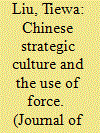

|
|
|
|
|
| Publication |
2014.
|
| Summary/Abstract |
This article reviews and explains Chinese attitudes towards the use of force in international affairs, especially from the perspective of strategic culture. The author traces back the traditional values which originated from ancient Chinese thoughts and also researches Mao Zedong's perception of war, which symbolizes the contemporary Chinese military strategic theory, and Deng Xiaoping and Hu Jintao's discourse on war thereafter, which represents the beliefs of the Chinese government after adopting the opening-up and reform policy. The case studies of the Korean War, the Vietnam War and the two Iraq Wars further explore the principles which dominate the diplomatic decision-making processes. The article concludes that China, in the predictable future, will still firmly adhere to the principles of state sovereignty, non-interference and non-use of force principles, while at the same time China will not hesitate to participate in the multilateral operations which are ratified with UN Security Council authorization and contribute increasingly to improving humanitarian situations due to its moral and political understanding of the use of force in international relations
|
|
|
|
|
|
|
|
|
|
|
|
|
|
|
|
| 6 |
ID:
090024
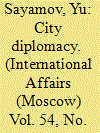

|
|
|
|
|
| Publication |
2008.
|
| Summary/Abstract |
Without a doubt, city diplomacy will have to be studied thoroughly as the most interesting phenomenon and an integral component of modern international affairs. Today it consists of an entire system of interaction between of state and municipal governments of cities, intergovernmental, intercity and nongovernmental international organizations, national, regional, municipal and local commercial and noncommercial agencies, institutes of civil society in various cities and countries around the world. The principal goal of international cooperation of cities within this system is perhaps comprehensive development of urban habitat, infrastructure, social sphere, culture, education, sport and leisure facilities to improve conditions for urban residents, foster peace, tolerance, religious and ethnic harmony, prevent and resolve threats and conflicts and threats to security, and to improve understanding between countries and nations.
|
|
|
|
|
|
|
|
|
|
|
|
|
|
|
|
| 7 |
ID:
191719
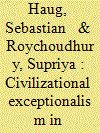

|
|
|
|
|
| Summary/Abstract |
Claims to civilizational exceptionalism have long been part of how states manoeuvre international affairs. While scholarly attention has started to move beyond the civilizational claims of western powers by engaging with those of states beyond the West, few accounts provide in-depth examinations of specific cases or bring these into dialogue with one another. This article offers a comparative analysis of how and why India and Turkey are positioning themselves as civilizational forces in global forums and international cooperation initiatives. Under the Narendra Modi regime, civilizational framings in India have found expression in the seemingly benign discourse of Hindu internationalism. In Turkey, successive governments under Recep Tayyip Erdoğan have linked their engagement abroad to the legacies of the Ottoman Empire. While there are clear differences in their respective civilizational antecedents, both countries draw on a combination of moral superiority and responsibility—India as vishwaguru (the world's guru) and Turkey as dünyanın vicdanı (the world's conscience)—as the legitimizing base for their assumed (normative) exceptionalism on the international stage. Overall, we argue that Indian and Turkish claims to civilizational exceptionalism serve two distinct but interrelated political projects: attempts to overcome centuries-long international marginalization, and efforts to buttress competitive authoritarianism domestically.
|
|
|
|
|
|
|
|
|
|
|
|
|
|
|
|
| 8 |
ID:
153026
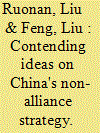

|
|
|
|
|
| Summary/Abstract |
As China’s rise continues to shape its role in international affairs, Chinese international relations scholars are engaging in a lively debate about the country’s grand strategy, particularly surrounding whether or not China should abandon the non-alliance strategy it has adopted since the early 1980s. Some scholars contend that a non-alliance strategy cannot safeguard China’s national interests in the face of the United States’ security alliance network throughout East Asia, and that without allies China’s rise will be contained by the US. Pro-alliance scholars, therefore, are especially favourable towards a formal alliance with Russia. However, orthodox scholars in favour of supporting the official position of non-alliance argue that a formal alliance deviates from the fundamental principles of independence and self-reliance that have historically guided China’s foreign policy. Moreover, a number of alternative strategies have been proposed to replace or complement the non-alliance strategy, among which are quasi-alliances, coalitions, and strategic partnerships. In practice, whether or not China forms alliances with other powers and neighbouring states depends on its self-defined role within the current international system, as well as its perception of external security threats. Considering both the external and internal constraints it faces, China is highly likely to maintain the non-alliance stance while pursuing other desirable approaches to making friends and partners.
|
|
|
|
|
|
|
|
|
|
|
|
|
|
|
|
| 9 |
ID:
132044
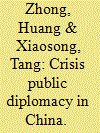

|
|
|
|
|
| Publication |
2014.
|
| Summary/Abstract |
Leon Trotsky, founder of the Soviet Red Army, once lamented "You Lmay not be interested in war, but war is interested in you".' His words are highly relevant to crisis public diplomacy today. Although not enough attention is paid to it, crisis public diplomacy is destined to become vital and complementary to other diplomacies in an era of frequent crisis. It mestic diplomatic strategies and appears to be very conspicuous in international affairs. This was clearly indicated in the report made by former General Secretary Hu Jintao at the 18th Congress of the CPC (Communist Party of China), as follows: "At present, as the global, national and our Party's conditions continue to undergo profound changes, we are faced with unprecedented opportunities for development as well as risks and challenges unknown before." Having a clear understanding of different situations, guarding against risks, dealing with challenges, solving crises and exploiting opportunities have become very real issues. China needs to follow the trend and engage in crisis public pressing times. Through overall coordination it will be control crises. and establish a positive image plays a prominent role in do diplomacy in these able to erase risks to security
|
|
|
|
|
|
|
|
|
|
|
|
|
|
|
|
| 10 |
ID:
084677
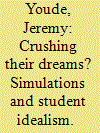

|
|
|
|
|
| Publication |
2008.
|
| Summary/Abstract |
In-class simulations can offer students an excellent opportunity to apply the lessons they have learned in a practical and fun manner. The literature on active learning in international relations demonstrates the many values simulations possess. In running a simulation on the conflict in Darfur, I identified an additional potential value in in-class simulations: they can be a technique for tempering student idealism. Students often fail to appreciate the disconnect between their personal political convictions and the political realities that impede conflict resolution. Simulations allow students to apply theory to practice in a way that encourages students to temper their idealism by acknowledging political realities on the ground. I discuss how a week-long simulation on Darfur encouraged students to balance idealism and realism and understand why reaching agreements in the international community can be so difficult.
|
|
|
|
|
|
|
|
|
|
|
|
|
|
|
|
| 11 |
ID:
139915
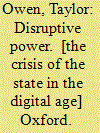

|
|
|
|
|
| Publication |
Oxford, Oxford University Press, 2015.
|
| Description |
x, 248p.Hbk
|
| Standard Number |
9780199363865
|
|
|
|
|
|
|
|
|
|
|
|
Copies: C:1/I:0,R:0,Q:0
Circulation
| Accession# | Call# | Current Location | Status | Policy | Location |
| 058270 | 327/OWE 058270 | Main | On Shelf | General | |
|
|
|
|
| 12 |
ID:
165211
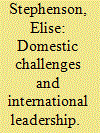

|
|
|
|
|
| Summary/Abstract |
Women in international affairs play powerful and influential roles in shaping laws and policies, negotiating on subjects of war, peace and security, and representing national interest. In Australia, women outnumber men at all levels of public service to executive level one. Yet, women remain under-represented in more senior ranks and appear to experience significant challenges gaining leadership in agencies involved in diplomacy and security. What are the gendered institutions at play in Australian international affairs? Using a comparative case study approach, this paper explores the experiences of senior executive level women leaders across the Australian Federal Government in four case agencies—the Department of Foreign Affairs and Trade (DFAT), Defence, Department of Home Affairs (DHA), and the Australian Federal Police (AFP). Women’s gendered challenges in international leadership are not surprising within a diplomatic history that has often restricted women’s roles based off the ‘appropriateness’ of sending women as envoys to nations of varying safety and respect for their status. What is surprising is that women report greater sexism, discrimination and harassment from within their own agencies, not from countries in which they are hosted. This has important ramifications globally on gaining and retaining women in international affairs leadership.
|
|
|
|
|
|
|
|
|
|
|
|
|
|
|
|
| 13 |
ID:
131014
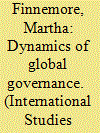

|
|
|
|
|
| Publication |
2014.
|
| Summary/Abstract |
It is hard to quarrel with Weiss and Wilkinson's argument that deeper investigation of global governance could have big payoffs, and the four "primary pursuits" or research tasks they sketch will interest many scholars in this field. My concern is that while Weiss and Wilkinson nicely describe the importance of these tasks, they offer only cursory suggestions about ways forward when they could do much more. Unlike Weiss and Wilkinson (hereafter W&W), I see a great deal of first rate work being done that speaks directly to issues they raise-how power is exercised globally,2 structures of global authority,3 increasing complexity,4 actor proliferation, and change. The problem, I would argue, is not that scholars are ignoring these issues, but that so much more could and should be done. In this short essay, I build on foundations laid by others to sketch more focused research agendas for global governance scholars in four areas to tackle some of the central questions W&W identify, with particular attention to their laudable interest in change.
|
|
|
|
|
|
|
|
|
|
|
|
|
|
|
|
| 14 |
ID:
129678
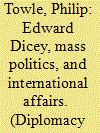

|
|
|
|
|
| Publication |
2014.
|
| Summary/Abstract |
The journalist, Edward Dicey, made an original contribution to the mid-nineteenth century debate on the growing involvement of the mass of people in political affairs. He argued that political education initially encouraged nationalism, causing the series of wars on which he reported. Beginning as an enthusiast for Camillo Cavour, the Piedmontese statesman, and the unification of Italy, Dicey became increasingly aware of the destructive impact of Irish nationalism on Britain and the threat to the British Empire from the growth of nationalist feelings amongst colonial peoples. However, he forecast that in the end, the forces of what at present is known as globalisation would bring nations closer together. Dicey is not well remembered today, but his work is important for showing the way in which a well-travelled Briton reacted to the breakdown in European security in the mid-nineteenth century and the growth of extra-European nationalism.
|
|
|
|
|
|
|
|
|
|
|
|
|
|
|
|
| 15 |
ID:
174925
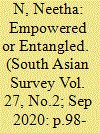

|
|
|
|
|
| Summary/Abstract |
In India, formation of NGO-aided self-help groups (SHGs) for production was seen as an important step to lift women out of economic marginalisation and, thus, for women’s empowerment. With changes in economic policies, challenges of wage employment for women were also assumed to have been addressed. In this context, this article, drawing from the history of empowerment discourse and its obsession with the economic aspect, examines women’s employment and its multiple dimensions The analysis provides insights into the gender-based inequalities in the labour market which are evident in the concentration of women workers in precariat, feminised jobs either under the control of the family or without any recognition or legal protection. The prevalence of regressive gendered ideologies in employment and in the division of housework raises critical questions about the understanding of the two critical pillars of empowerment, namely, choice and agency.
|
|
|
|
|
|
|
|
|
|
|
|
|
|
|
|
| 16 |
ID:
159458
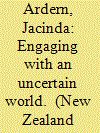

|
|
|
|
|
| Summary/Abstract |
Jacinda Ardern gives an outline of her government’s approach to international affairs.
|
|
|
|
|
|
|
|
|
|
|
|
|
|
|
|
| 17 |
ID:
102894
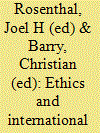

|
|
|
|
|
| Edition |
3rd ed
|
| Publication |
Washington, DC, Georgetown University Press, 2009.
|
| Description |
xv, 352p.
|
| Series |
Carnegie council for ethics in international affairs
|
| Standard Number |
9781589012721
|
|
|
|
|
|
|
|
|
|
|
|
Copies: C:1/I:0,R:0,Q:0
Circulation
| Accession# | Call# | Current Location | Status | Policy | Location |
| 055837 | 172.4/ROS 055837 | Main | On Shelf | General | |
|
|
|
|
| 18 |
ID:
089804
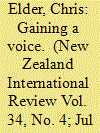

|
|
|
|
|
| Publication |
2009.
|
| Summary/Abstract |
As a small country, New Zealand struggles to assert itself in the world, in complete contrast to a great power like Russia. Its military forces are small in size and will never tip the balance in pursuit of diplomatic objectives. Its economy is, in world terms, insignificant. Nor does New Zealand have any centuries-long diplomatic tradition. Its foreign service developed only during the Second World War.
|
|
|
|
|
|
|
|
|
|
|
|
|
|
|
|
| 19 |
ID:
133839
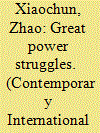

|
|
|
|
|
| Publication |
2014.
|
| Summary/Abstract |
International order is the norm, standards and corresponding guaranteeing mechanism, decision making process, and rule of procedures established by members of the international system to coordinate and deal with various international affairs, in order to maintain stability and the normal operation in the international system. As an international public product, international order is usually supported by the major actors of the international system.
|
|
|
|
|
|
|
|
|
|
|
|
|
|
|
|
| 20 |
ID:
187643
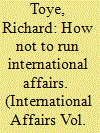

|
|
|
|
|
| Summary/Abstract |
This article explores three case-studies—the Munich crisis of 1938, the Suez crisis and war of 1956 and the Iraq war of 2003—as examples of ‘how not to run international affairs’. On the face of it, all three episodes were disasters. Irrespective of whether Munich was strategically correct, Neville Chamberlain's public presentation of the agreement was a clear miscalculation. Anthony Eden created an elaborate pretext for invading Egypt, which was nevertheless so see-through that it destroyed British credibility. Tony Blair appears to have persuaded himself into believing that Saddam had weapons of mass destruction, and basing his case for war upon this idea left him exposed when the weapons were shown not to exist. Whereas it is easy to say that these mistakes should not have been made, it is harder to suggest mechanisms that would prevent leaders falling prey to such delusions, when their immediate political interests appear to depend on them. The article concludes that in these three cases failure was over-determined; on the other hand, there are many everyday crises that foreign policy actors, who understand ‘how not to run international affairs’, succeed in preventing from turning into disasters.
|
|
|
|
|
|
|
|
|
|
|
|
|
|
|
|
|
|
|
|
|